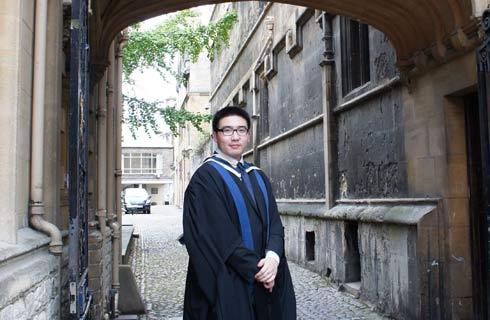理学学士(荣誉)生物学与历史和科学哲学
BSc (Hons) Biology and History and Philosophy of Science

学历文凭
Bachelor Degree with Honours

专业院系
School of Philosophy, Religion and History of Science

开学时间

课程时长

课程学费

国际学生入学条件
IDP—雅思考试联合主办方

雅思考试总分
- 雅思总分:
- 托福网考总分:
- 托福笔试总分:
- 其他语言考试:
CRICOS代码: CV15
申请截止日期: 请与IDP联系 以获取详细信息。
课程简介
This joint honours degree enables you to develop knowledge and skills through an exploration of the science and philosophy of living things, as well as a historical understanding of how these fields of study have evolved over time. You’ll combine practical lab work with classroom-based learning, developing a broad set of biological knowledge and skills, whilst exploring the history of scientific thought, the links between magic, science and religion and the nature of scientific knowledge. A combination of compulsory and optional modules will enable you to improve your understanding of key topics such as philosophy of science, cell biology and genetics and gain specialist knowledge in areas like philosophy of biology, behavioural ecology and animal development biology.Specialist facilitiesThe Faculty of Biological Sciences is one of the largest centres for biological sciences research in the UK and home to cutting edge research facilities.Your course makes use of the UK’s largest and most advanced facility for research into pig nutrition, behaviour, welfare and health, production systems, and the National Pig Centre. This is part of the University’s research farm, where you can also learn about sustainable agriculture, while you can study plant biology in the Faculty’s extensive greenhouse and plant growth facilities.You’ll also have the opportunity to study ecology and behaviour in natural surroundings in the city’s green spaces and nearby Yorkshire Dales National Park which provide a range of habitats that support modules in ecology and behaviour.
相关申请
 预科
预科 奖学金
奖学金 实习机会
实习机会 在校学习
在校学习 跨境学习
跨境学习 校园授课-线上开始
校园授课-线上开始 在线/远程学习
在线/远程学习
开学时间&学费
学费信息仅供参考,请与IDP联系以获取详细信息
| 开学时间 | 时长 | 学费 | 地点 |
|---|
学校排名

世界排名153
数据源:
泰晤士高等教育世界大学排名
关于利兹大学

利兹大学在《2025 完整大学指南》中名列英国大学前25名,在2025 QS世界大学排名中名列世界前100名。它也是罗素大学集团大学之一,这是英国著名的顶尖研究密集型大学名单。该大学的学生满意度很高,在英国排名第三(2018年《泰晤士报高等教育学生体验调查》)。作为同一项调查的一部分,该大学的校园设施在英国排名第二,这是对学生发挥潜力的绝佳校园的认可。近年来,两栋新建筑投资超过1.2亿英镑。体育设施也被认为是世界级的。The Edge是一个为学生提供的令人难以置信的健身中心,包括一个25米的室内游泳池、攀岩墙和为不同体育活动设置的各种大厅。这是一所热情友好的大学,拥有充满活力、多样化的学生群体。事实上,来自世界130多个不同国家的13800多名国际学生在利兹大学学习。学生会是这个国家最活跃、最活跃的工会之一。学生可以加入300多个俱乐部和社团,利兹大学联盟(LUU)是英国第一个被全国学生联合会评为''优秀''的俱乐部和社团。
本校相关课程

生物多样性与保护
学历文凭
Masters Degree (Taught)
开学日期
课程费用总额


统计博士学位
学历文凭
Ph.D.
开学日期
课程费用总额


纯粹数学博士学位
学历文凭
Ph.D.
开学日期
课程费用总额


应用数学博士学位
学历文凭
Ph.D.
开学日期
课程费用总额


PhD in Geography
学历文凭
Ph.D.
开学日期
课程费用总额


PhD in Microwave and Millimetre Wave Engineering
学历文凭
Ph.D.
开学日期
课程费用总额

其他相关课程

国家土著研究中心哲学博士
 澳大利亚国立大学
澳大利亚国立大学学历文凭
Ph.D.
开学日期
课程费用总额


芬纳环境与社会学院哲学硕士
 澳大利亚国立大学
澳大利亚国立大学学历文凭
Masters Degree (Research)
开学日期
课程费用总额


社会科学学士(荣誉学位)
 纽卡斯尔大学
纽卡斯尔大学学历文凭
Bachelor Degree with Honours
开学日期
课程费用总额


哲学博士(人文,艺术和社会科学)
 斯威本科技大学
斯威本科技大学泰晤士高等教育世界大学排名:282
学历文凭
Ph.D.
开学日期
课程费用总额


国际发展研究生文凭
 乐卓博大学
乐卓博大学泰晤士高等教育世界大学排名:267
学历文凭
Graduate Diploma
开学日期
课程费用总额


土著哲学博士
 南十字星大学
南十字星大学泰晤士高等教育世界大学排名:456
学历文凭
Ph.D.
开学日期
课程费用总额










 英国
英国